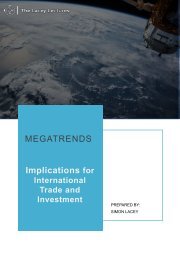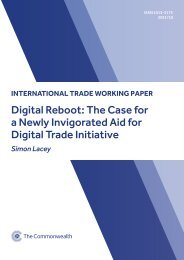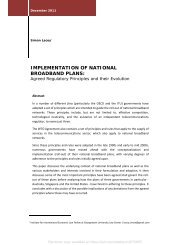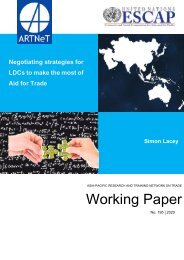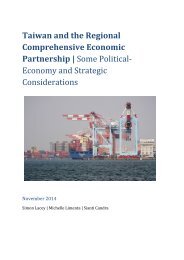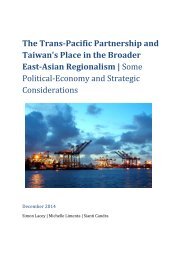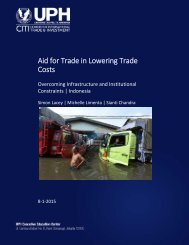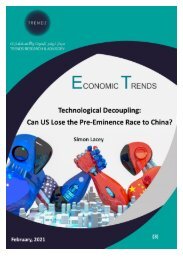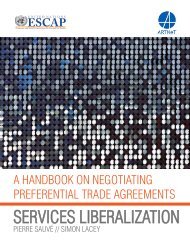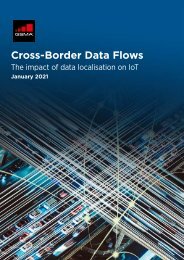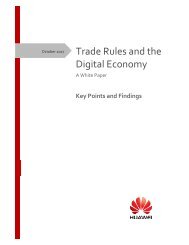Life after Doha: Some reflections in the run up to the 9th WTO Ministerial Conference on Bali
This is a book chapter that I wrote for an edited volume commissioned by the World Trade Institute in Berne, University Pelita Harapan and the Economic Research Institute for ASEAN and East Asia (ERIA), both in Jakarta. My chapter discusses how the multilateral trading system came to become intractibly bogged down in the Doha Round and argues that the WTO is still the best organization the world has for tacking a number of increasingly pressing issues. The book in its entirety can be viewed and downloaded at: https://www.eria.org/publications/the-road-to-bali-eria-perspectives-on-the-wto-ministerial-and-asian-integration/
This is a book chapter that I wrote for an edited volume commissioned by the World Trade Institute in Berne, University Pelita Harapan and the Economic Research Institute for ASEAN and East Asia (ERIA), both in Jakarta.
My chapter discusses how the multilateral trading system came to become intractibly bogged down in the Doha Round and argues that the WTO is still the best organization the world has for tacking a number of increasingly pressing issues.
The book in its entirety can be viewed and downloaded at: https://www.eria.org/publications/the-road-to-bali-eria-perspectives-on-the-wto-ministerial-and-asian-integration/
- No tags were found...
Create successful ePaper yourself
Turn your PDF publications into a flip-book with our unique Google optimized e-Paper software.
<str<strong>on</strong>g>Life</str<strong>on</strong>g> <str<strong>on</strong>g>after</str<strong>on</strong>g> <str<strong>on</strong>g>Doha</str<strong>on</strong>g> | <br />
tensi<strong>on</strong>s c<strong>on</strong>fr<strong>on</strong>t<str<strong>on</strong>g>in</str<strong>on</strong>g>g <str<strong>on</strong>g>the</str<strong>on</strong>g> world trad<str<strong>on</strong>g>in</str<strong>on</strong>g>g system. 59 It is almost certa<str<strong>on</strong>g>in</str<strong>on</strong>g>ly wr<strong>on</strong>g <str<strong>on</strong>g>to</str<strong>on</strong>g> assume that <br />
because <str<strong>on</strong>g>the</str<strong>on</strong>g> <str<strong>on</strong>g>Doha</str<strong>on</strong>g> Round has stalled, worldwide efforts <str<strong>on</strong>g>to</str<strong>on</strong>g> liberalize <str<strong>on</strong>g>in</str<strong>on</strong>g>ternati<strong>on</strong>al trade have <br />
stalled with it. To be sure, efforts at achiev<str<strong>on</strong>g>in</str<strong>on</strong>g>g greater market open<str<strong>on</strong>g>in</str<strong>on</strong>g>g and a reducti<strong>on</strong> <str<strong>on</strong>g>in</str<strong>on</strong>g> trade <br />
barriers <strong>on</strong> a multilateral basis are currently <strong>on</strong> ice, but <str<strong>on</strong>g>the</str<strong>on</strong>g> march of trade and <str<strong>on</strong>g>in</str<strong>on</strong>g>vestment <br />
liberalizati<strong>on</strong> is mov<str<strong>on</strong>g>in</str<strong>on</strong>g>g <strong>on</strong> <str<strong>on</strong>g>in</str<strong>on</strong>g> different forms and fora. After all, what is <str<strong>on</strong>g>the</str<strong>on</strong>g> spaghetti bowl of <br />
preferential trad<str<strong>on</strong>g>in</str<strong>on</strong>g>g arrangements that has swept <str<strong>on</strong>g>up</str<strong>on</strong>g> so many <str<strong>on</strong>g>WTO</str<strong>on</strong>g> Members if not an <br />
unprecedented surge of energy <str<strong>on</strong>g>to</str<strong>on</strong>g>wards <str<strong>on</strong>g>the</str<strong>on</strong>g> reducti<strong>on</strong> of trade barriers (albeit <strong>on</strong> a <br />
discrim<str<strong>on</strong>g>in</str<strong>on</strong>g>a<str<strong>on</strong>g>to</str<strong>on</strong>g>ry and thus admittedly "third-‐best" policy opti<strong>on</strong> basis 60 )? Many ec<strong>on</strong>omists and <br />
trade policy commenta<str<strong>on</strong>g>to</str<strong>on</strong>g>rs view <str<strong>on</strong>g>the</str<strong>on</strong>g> pivot <str<strong>on</strong>g>to</str<strong>on</strong>g>wards preferentialism as an alarm<str<strong>on</strong>g>in</str<strong>on</strong>g>g move <str<strong>on</strong>g>in</str<strong>on</strong>g> <str<strong>on</strong>g>the</str<strong>on</strong>g> <br />
wr<strong>on</strong>g directi<strong>on</strong>. 61 O<str<strong>on</strong>g>the</str<strong>on</strong>g>rs 62 prefer <str<strong>on</strong>g>to</str<strong>on</strong>g> take a l<strong>on</strong>ger view, s<str<strong>on</strong>g>in</str<strong>on</strong>g>ce, <str<strong>on</strong>g>after</str<strong>on</strong>g> all, was not <str<strong>on</strong>g>the</str<strong>on</strong>g> 1948 GATT <br />
first preceded by a slew of bilateral preferential trade agreements entered <str<strong>on</strong>g>in</str<strong>on</strong>g><str<strong>on</strong>g>to</str<strong>on</strong>g> by Cordell Hull <br />
under <str<strong>on</strong>g>the</str<strong>on</strong>g> Reciprocal Trade Agreements Act of 1938? 63 Taken <str<strong>on</strong>g>to</str<strong>on</strong>g>ge<str<strong>on</strong>g>the</str<strong>on</strong>g>r, <str<strong>on</strong>g>the</str<strong>on</strong>g> current two <br />
preferential trad<str<strong>on</strong>g>in</str<strong>on</strong>g>g arrangements be<str<strong>on</strong>g>in</str<strong>on</strong>g>g negotiated under <str<strong>on</strong>g>the</str<strong>on</strong>g> auspices of <str<strong>on</strong>g>the</str<strong>on</strong>g> Transpacific <br />
Partnership (TPP) and <str<strong>on</strong>g>the</str<strong>on</strong>g> Transatlantic Trade and Investment Partnership (TTIP) will cover close <br />
<str<strong>on</strong>g>to</str<strong>on</strong>g> 80 per cent of global GDP 64 . The discrim<str<strong>on</strong>g>in</str<strong>on</strong>g>a<str<strong>on</strong>g>to</str<strong>on</strong>g>ry side effects of not be<str<strong>on</strong>g>in</str<strong>on</strong>g>g part of <str<strong>on</strong>g>the</str<strong>on</strong>g>se <br />
agreements will be felt by <strong>on</strong>ly a small number of countries, which w<strong>on</strong>t <str<strong>on</strong>g>in</str<strong>on</strong>g>clude most of <str<strong>on</strong>g>the</str<strong>on</strong>g> <br />
world's poorest nati<strong>on</strong>s, s<str<strong>on</strong>g>in</str<strong>on</strong>g>ce <str<strong>on</strong>g>the</str<strong>on</strong>g>se countries already benefit from duty free (and largely quota <br />
free) access <str<strong>on</strong>g>to</str<strong>on</strong>g> <str<strong>on</strong>g>the</str<strong>on</strong>g>ir ma<str<strong>on</strong>g>in</str<strong>on</strong>g> export markets under a variety of frameworks such as Everyth<str<strong>on</strong>g>in</str<strong>on</strong>g>g But <br />
Arms (EBA), <str<strong>on</strong>g>the</str<strong>on</strong>g> African Growth and Opportunity Act (AGOA), <str<strong>on</strong>g>the</str<strong>on</strong>g> Generalised System of <br />
Preferences (GSP), and preferential access agreements like <str<strong>on</strong>g>the</str<strong>on</strong>g> EU's extensive network of <br />
Ec<strong>on</strong>omic Partnership Agreements (EPAs). <br />
Even look<str<strong>on</strong>g>in</str<strong>on</strong>g>g bey<strong>on</strong>d <str<strong>on</strong>g>the</str<strong>on</strong>g> myriad of preferential trad<str<strong>on</strong>g>in</str<strong>on</strong>g>g arrangements, it is now possible <str<strong>on</strong>g>to</str<strong>on</strong>g> <br />
detect signs of trade liberalizati<strong>on</strong> at <str<strong>on</strong>g>the</str<strong>on</strong>g> <str<strong>on</strong>g>WTO</str<strong>on</strong>g>, even <str<strong>on</strong>g>in</str<strong>on</strong>g> <str<strong>on</strong>g>the</str<strong>on</strong>g> absence of movement under <str<strong>on</strong>g>the</str<strong>on</strong>g> <br />
<str<strong>on</strong>g>Doha</str<strong>on</strong>g> Work Program. This has proven true for an expanded agreement <strong>on</strong> government <br />
59 See Bluste<str<strong>on</strong>g>in</str<strong>on</strong>g>'s mus<str<strong>on</strong>g>in</str<strong>on</strong>g>gs <str<strong>on</strong>g>in</str<strong>on</strong>g> Chapter 14 of Misadventures of <str<strong>on</strong>g>the</str<strong>on</strong>g> Most Favored Nati<strong>on</strong>s, op cit. <br />
60 The statement <str<strong>on</strong>g>in</str<strong>on</strong>g> brackets assumes that <str<strong>on</strong>g>the</str<strong>on</strong>g> "first best" policy opti<strong>on</strong> for liberalizati<strong>on</strong> is <str<strong>on</strong>g>the</str<strong>on</strong>g> unilateral lower<str<strong>on</strong>g>in</str<strong>on</strong>g>g or elim<str<strong>on</strong>g>in</str<strong>on</strong>g>ati<strong>on</strong> <br />
of trade barriers (desirable ec<strong>on</strong>omically but not always achievable politically); <str<strong>on</strong>g>the</str<strong>on</strong>g> "sec<strong>on</strong>d best" policy opti<strong>on</strong> is multilateral <br />
liberalizati<strong>on</strong> under <str<strong>on</strong>g>the</str<strong>on</strong>g> <str<strong>on</strong>g>WTO</str<strong>on</strong>g> or a similar framework; and that thus any liberalizati<strong>on</strong> undertaken <str<strong>on</strong>g>in</str<strong>on</strong>g> <str<strong>on</strong>g>the</str<strong>on</strong>g> form of preferential <br />
trad<str<strong>on</strong>g>in</str<strong>on</strong>g>g arrangements is little more than a "third best" policy opti<strong>on</strong>. <br />
61 Jagdish Bhagwati and Anne O. Krueger, The Dangerous Drift <str<strong>on</strong>g>to</str<strong>on</strong>g> Preferential Trade Agreements, American Enterprise Institute, <br />
1995. <br />
62 Richard Baldw<str<strong>on</strong>g>in</str<strong>on</strong>g> and Patrick Low, Multilateraliz<str<strong>on</strong>g>in</str<strong>on</strong>g>g Regi<strong>on</strong>alism, Cambridge University Press, 2009. <br />
63 Kenneth W. Dam, Cordell Hull, The Reciprocal Trade Agreement Act, and <str<strong>on</strong>g>the</str<strong>on</strong>g> <str<strong>on</strong>g>WTO</str<strong>on</strong>g>, Brook<str<strong>on</strong>g>in</str<strong>on</strong>g>gs, 2004, at: <br />
http://www.brook<str<strong>on</strong>g>in</str<strong>on</strong>g>gs.edu/research/papers/2004/10/10globalec<strong>on</strong>omics-‐dam (visited <strong>on</strong> 1 August 2013); for a more <br />
his<str<strong>on</strong>g>to</str<strong>on</strong>g>rically au<str<strong>on</strong>g>the</str<strong>on</strong>g>ntic source, see: Richard N. Gardner, Sterl<str<strong>on</strong>g>in</str<strong>on</strong>g>g Dollar Diplomacy, Oxford at <str<strong>on</strong>g>the</str<strong>on</strong>g> Clarend<strong>on</strong> Press, 1956. <br />
64 The TTIP and <str<strong>on</strong>g>the</str<strong>on</strong>g> TPP are reported as each cover<str<strong>on</strong>g>in</str<strong>on</strong>g>g approximately 40 percent and 60 percent of global GDP, see: The <br />
Wash<str<strong>on</strong>g>in</str<strong>on</strong>g>g<str<strong>on</strong>g>to</str<strong>on</strong>g>n Post article dated 8 July 2009 entitled "Talks over a huge U.S.-‐Europe trade deal start this week. Here’s what you <br />
need <str<strong>on</strong>g>to</str<strong>on</strong>g> know" at: http://www.wash<str<strong>on</strong>g>in</str<strong>on</strong>g>g<str<strong>on</strong>g>to</str<strong>on</strong>g>npost.com/blogs/w<strong>on</strong>kblog/wp/2013/07/08/talks-‐over-‐a-‐huge-‐u-‐s-‐europe-‐trade-deal-‐start-‐this-‐week-‐heres-‐what-‐you-‐need-‐<str<strong>on</strong>g>to</str<strong>on</strong>g>-‐know/<br />
(visited <strong>on</strong> 1 August 2013); see also USTR press release dated 25 <br />
September 2008 entitled "Trans-‐Pacific Partners and United States Launch FTA Negotiati<strong>on</strong>s", at: http://www.ustr.gov/trans-pacific-‐partners-‐and-‐united-‐states-‐launch-‐fta-‐negotiati<strong>on</strong>s<br />
(visited <strong>on</strong> 1 August 2013). <br />
21




